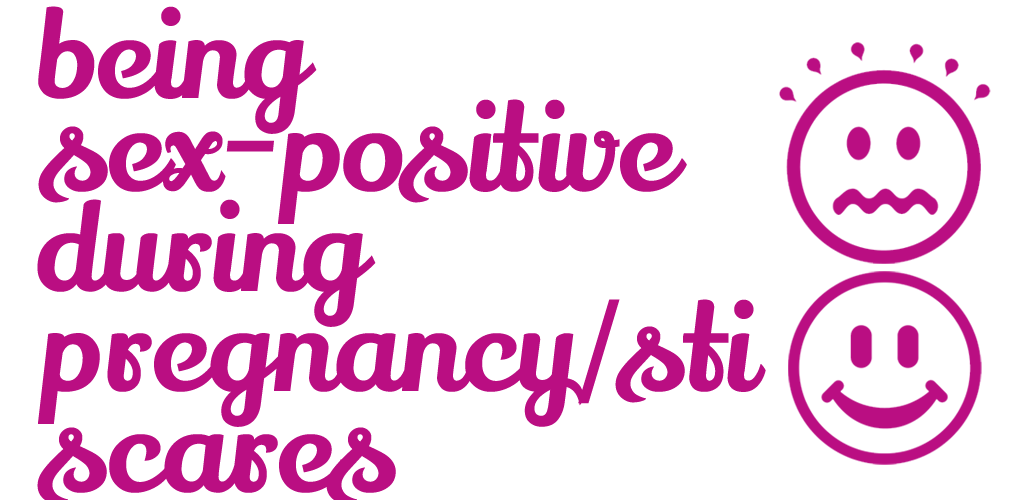

This is a really common question. For people who haven’t read over our site for info, we have pages on:
Very quickly, periods can be late for lots of reasons, not just pregnancy. If you’ve done a preg test and it came back negative, it’s maybe a good idea to check in with your clinician to see what’s up. But in general, you can trust preg tests to be accurate if they’re done 14 days after a pregnancy risk.
But now onto the bigger part of the question. Pregnancy scares (or STI scares) can bring up a lot of feelings – stress, fear, worry, anxiety, guilt, shame, etc. These are all not the most fun to deal with, but we’d like to take a moment to explore the last two in that list. Guilt and shame often come up for people in these situations because much of our sex ed (if we’re lucky enough to get any) doesn’t include a lot of sex positive messages. And it’s hard to shake off the stress and worry after getting negative test results or reassuring information if what you’re also dealing with is sex negativity or stigma. So how do we deal with this? Well, let’s start with at the beginning: What is sex positivity?
srhweek.ca has a pretty great definition of sex positivity that goes like this:
Sex positivity embraces sexuality with the view that the only relevant concerns when it comes to a sexual act, practice or experience are the consent, pleasure and well-being of the people engaged in it or the people affected by it. Sex positivity places no moral value on different sexualities or sex acts. It helps us set aside our judgments and make room for the diversity of human sexuality.
So with a focus on well-being, sex positivity means being informed and respecting your sexual health needs. For some people this means doing things like research on sexual health topics, talking with partners about sexual and health histories, practicing safer sex (condoms, birth control, etc), or regular STI testing. Being sex positive understands that there is always going to be a small risk of something when it comes to sex, whether it’s STIs, pregnancy, or even just pulling a muscle. Health stuff can happen, and being sex positive opens up space for that to be okay and normal.
srhweek.ca says:
Sex negativity devalues sex and experience. It makes us believe that any sexual expression that does not conform to what society has decided to define as normal is not valuable. It erases honest expression of sexualities and authentic connection between people. It often leads to people feeling shame and fear when it comes to sex.
Sex negativity perpetuates the idea that sex is harmful, shameful, disgusting or sinful, which is 100% not true. It prioritizes sex that is for procreation between married, monogamous, cisgender, heterosexual people. And while that sex is maybe great, it is no better than sex between other people in other types of relationships.
Sex Negativity can affect your headspace when dealing with a pregnancy/STI scare by making you feel bad for the scare even happening. It gets people to automatically blame themselves (and sex) for their health concerns, making people feel like choosing to have sex is the reason that things are off with their bodies. It can also make you automatically associate sex with something dangerous or risky – the feeling that an unwanted outcome is inevitable; so it becomes easy to blame ourselves for participating in act we have been told many times is unsafe.
And it doesn’t matter if someone did or didn’t use a condom, or maybe forgot to take their birth control pill. Pregnancy/STI scares happen to pretty much everybody at some point in their life, and nobody deserves to feel stupid because of it. Blaming yourself or feeling ashamed can then make it hard to reach out for help, because you feel so stupid just for needing help. A pregnancy/STI scares is not a consequence that people should have to suffer through alone or in shame just because they chose to have sex.
Being sex positive means accepting that accidents and surprises happen. It means checking in on your sexual health and well-being before, during, and after sex. It’s the mindset that encourages you to feel empowered by going and getting a preg test, not ashamed for it; and similarly, the mindset that helps you feel more confident in the test results and your ability to approach those results. Sex positivity understands that a lot of factors and decisions go into when, why, and how someone has sex, and that nobody’s sexual well-being is enhanced by being shamed or blamed. Being sex positive should help you feel more grounded during a pregnancy/STI scare (e.g., it’s maybe not your fault, it’s maybe not because of sex, and it’s maybe not the end of the world, etc), and more confident that you are capable of addressing and dealing with health concerns as they come up (because you totally are!).
And it’s worth saying that it’s called “Practicing Safer Sex,” not “Doing Sex Right.” Nobody is doing sex wrong because they have a pregnancy/STI scare. Safer sex is a thing that you work on, in different ways at different times.
Sometimes it takes time for people to unlearn sex negativity, so it can take some practice to get comfortable at talking to your partner(s) about STIs or birth control. Heck, it can also feel really awkward talking to your friends about sex-related things! But you don’t have to go through pregnancy/STI scares alone. Here are some things you can try to get yourself more comfortable asking your friends for help:
Sometimes it can also feel embarrassing talking to a health professional about pregnancy or STIs. Here are some suggestions for what you can do to prep yourself for getting help from a health care professional:
A great way to be sex positive is to offer support to a friend going through a pregnancy/STI scare — but it’s not always easy! Here are some things you can do to be a sex positive support for a friend:
It’s important to acknowledge that a lot of the pregnancy situations people come to us with are situations where there is no risk of pregnancy, people have already talked to friends/adults/professionals and/or taken pregnancy test(s), but still feel a lot of anxiety. This is where sex positivity comes super handy, because a part of our sexual well-being is our mental wellbeing: how we think/feel about sex, what we think the “consequences” of sex are, what we’re ready for, our fears about sex, what we love about it, what we don’t, etc. As we start to practice how to talk to our partners, friends, family, and community about birth control, pregnancy tests, and STI tests (physical safer sex), we can also start to practice how to talk to them about what we feel about the choices and outcomes of sex (like pregnancy) and why we feel that way (why do we feel so anxious in this situation when we “know” there’s no risk of pregnancy?). But that’s all easier said than done — it’s an understatement to say it’s tough to unlearn sex negativity. Keep your eyes peeled for a future THS blog post on how to be more sex positive or comfortable with sex and sexuality in general. But for now, we hope this answers your question!
| Quick Note |
| Again, we’ve got lots of pages on TeenHealthSource.com that covers pregnancy options and STI info. One place we’d recommend checking out is Talking About Safer Sex, which has lots of info on talking to partners about birth control or other kinds of protection: Link. |
For more information on being sex positive, check out these resources:
If you have questions about this topic, feel free to contact one of our peer educators. [Link]
Last Updated: April 2020

This series explores a small portion of the great wide world of Virtual Sex! Our first instalment covers questions like: What is it? Why do people do it? How do people do it? Is it even “doing it”? And more?

PRUDEmag is a hot new Toronto-based zine for spinsters, rule-makers, asexuals, relationship anarchists, & all others resisting a sex-necessary culture. We caught up with some of the people behind the zine for our the latest in our 5 Questions series!

How likely you are to become pregnant can actually change throughout your menstrual cycle, this article talks about how that happens and why!